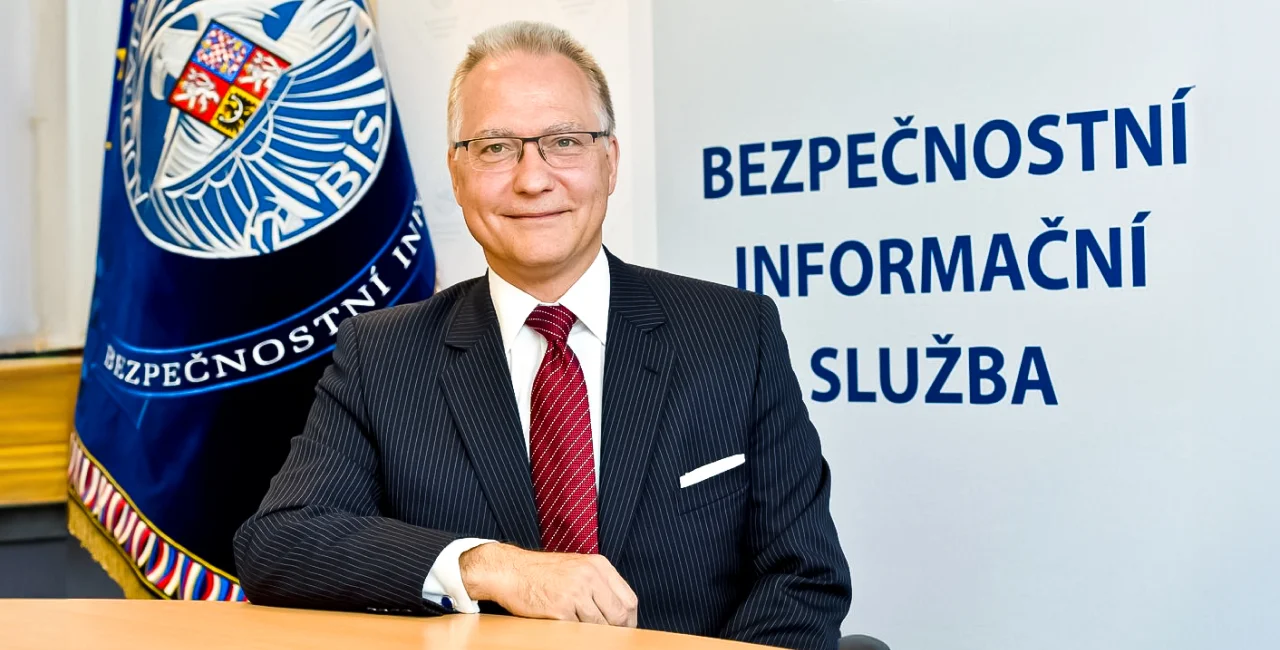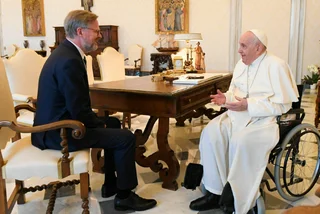The Czech civilian counterintelligence agency, the Security Information Service (BIS), has revealed that individuals linked to the media platform Voice of Europe aimed to engage in espionage within the EU, Michal Koudelka, director of BIS, disclosed.
Koudelka, speaking at a conference Monday in the Chamber of Deputies, praised the Czech government’s tough and uncompromising stance in placing the platform and pro-Russian Ukrainian businessmen Artyom Marchevsky and Viktor Medvedchuk on the national sanctions list at the end of March. Based on a proposal from the Czech Republic, the EU has now also decided to sanction the men.
Three entities working for the Kremlin
According to Koudelka, the activities “under the guise” of the Prague-based, pro-Moscow news website Voice of Europe had three levels. The first involved various politicians on the platform giving pro-Russian or anti-Ukrainian interviews. The second, more severe level, was that with Russian money, those operating under the platform’s cover placed articles and information in Western media that were “quite pro-Russian, anti-Ukrainian, anti-Western and fulfilled an effort to influence public opinion.”
1/2 Success for #CzechDiplomacy!
— Czech Ministry of Foreign Affairs (@CzechMFA) May 27, 2024
â—ï¸ Three entities working for the Kremlin regime have been added to the EU sanctions list at the proposal of Czechia 🇨🇿.
â—ï¸ All restrictions previously imposed by Czechia are now valid in all 27 EU 🇪🇺 Member States.
More information 👇 pic.twitter.com/IGmnbpAXVV
On the third level, the people operating under the cover of Voice of Europe sought to interfere in the June European Parliament elections and ensure espionage inside the EU. “These are very serious things that our service uncovered,” Koudelka said.
The counterintelligence chief praised the Czech government’s uncompromising actions, stating, “This is a language the Russians understand; this is how we should always act.”
EU sanctions Czech-proposed Voice of Europe
- The EU added three entities to the sanctions list proposed by the Czech Republic: Voice of Europe, Artyom Marchevsky, and Viktor Medvedchuk.
- The Czech govt. sanctioned these entities in March, citing pro-Russian influence on European politicians.
- Sanctions now apply EU-wide, including entry bans and freezing of funds.
- Marchevsky, linked to Voice of Europe, was accused of spreading disinformation and influencing politicians.
- Medvedchuk, with Marchevsky, allegedly ran influence networks from Russia.
- The initial sanctions were part of a larger package, but due to complications, they were expedited and approved by EU foreign ministers.
- The Czech Republic also wants to restrict Russian diplomats’ movement in the Schengen area.
Koudelka warned, however, that breaking the network has not stopped similar Russian activities in Europe and that "there are other similar networks operating here that will try to threaten basic democratic principles, break up European unity, undermine trust in the state and its institutions and membership in international organizations.”
Foreign minister: Success for Czech diplomacy
The Czech government placed Voice of Europe and the two businessmen on its national sanctions list at the end of March. The Czech Foreign Ministry stated, "Three entities working for the Kremlin regime have been placed on the EU sanctions list at the suggestion of the Czech Republic. All the restrictions already applied by the Czech Republic to them now apply to all 27 EU member states.”
Speaking of the EU's decision today to impose sanctions on Marchevsky and Medvedchuk, Minister of Foreign Affairs Jan Lipavský told Expats.cz: “I am very happy. This is a great success for Czech diplomacy and the country’s internal security. We will continue looking for more measures to help prevent the spread of Russian propaganda and disinformation.”
Speaking of broader efforts to limit Russian influence in Czechia, Lipavský added: “I am also calling on more European countries to limit the movement of Russian diplomats through the Schengen area, including family members. Lipavský told us he was pleased with Poland’s decision earlier today to restrict the movement of Russian diplomats on Polish territory.












 Reading time: 3 minutes
Reading time: 3 minutes 
























